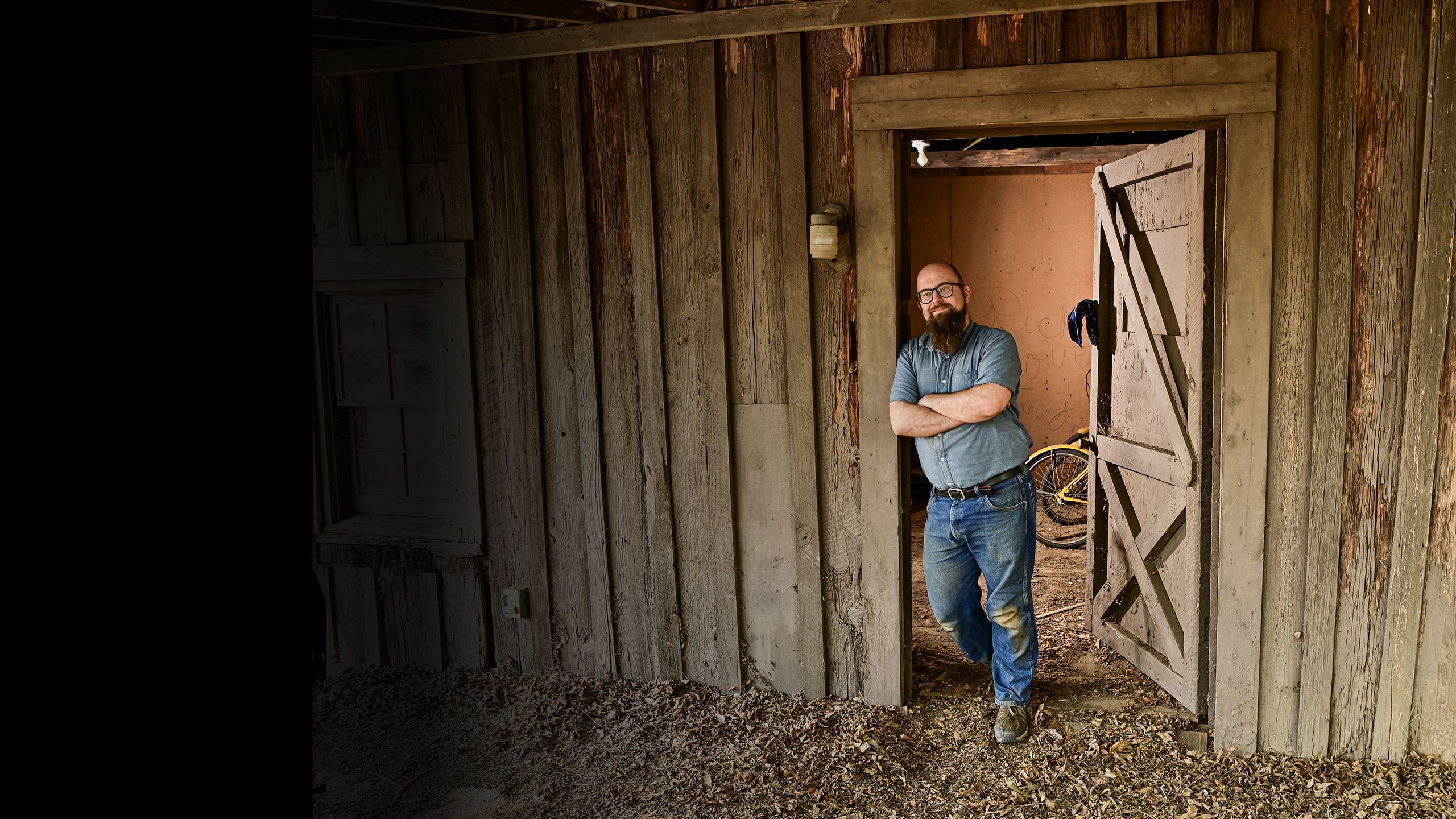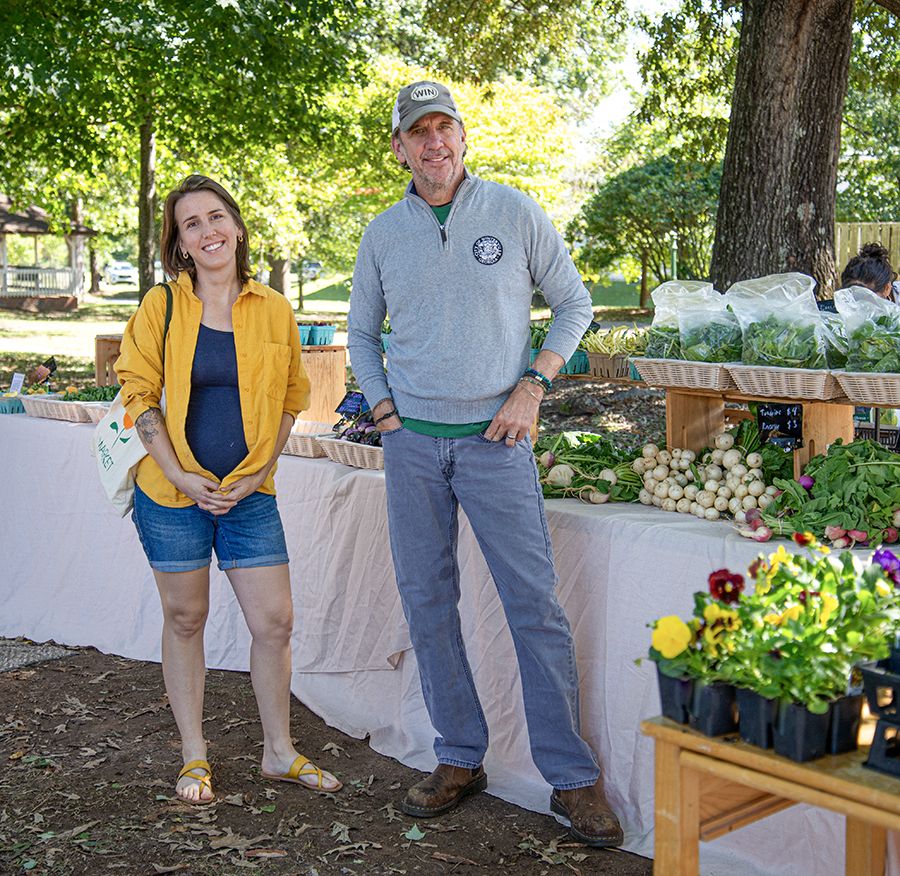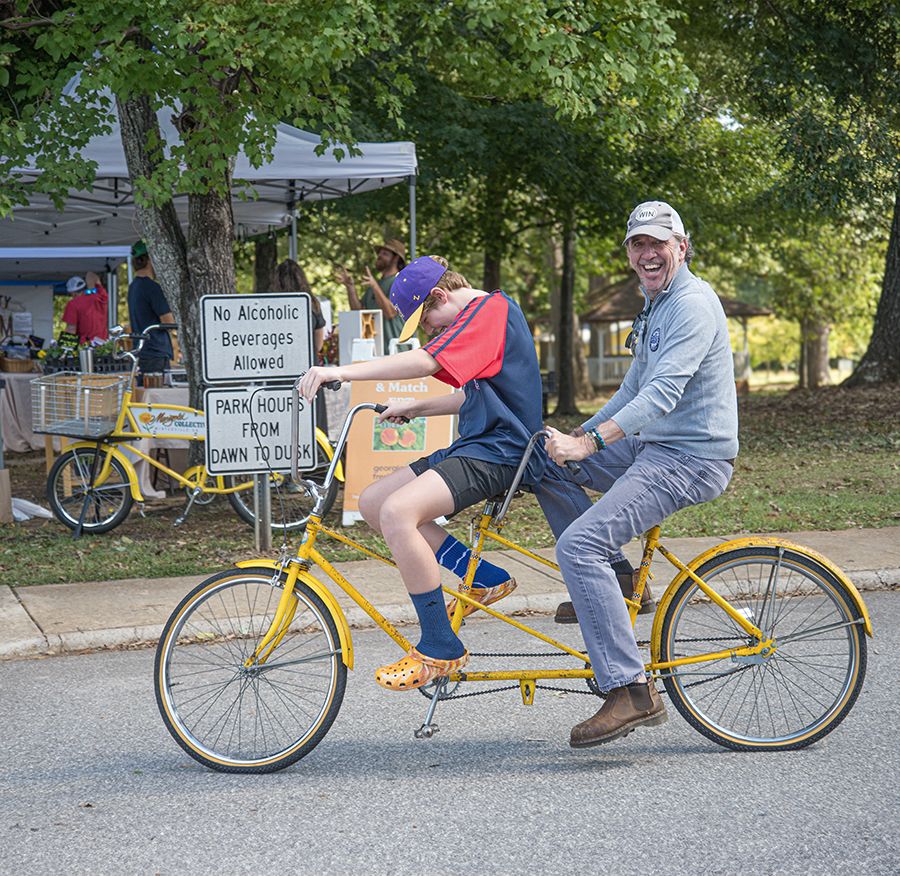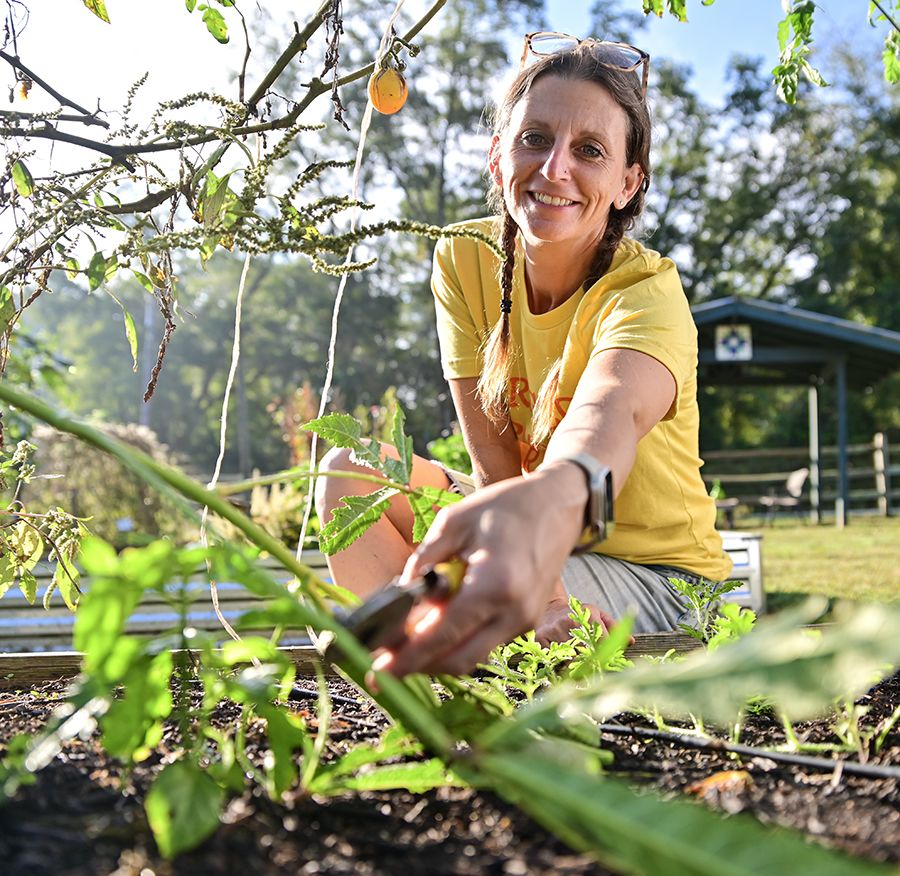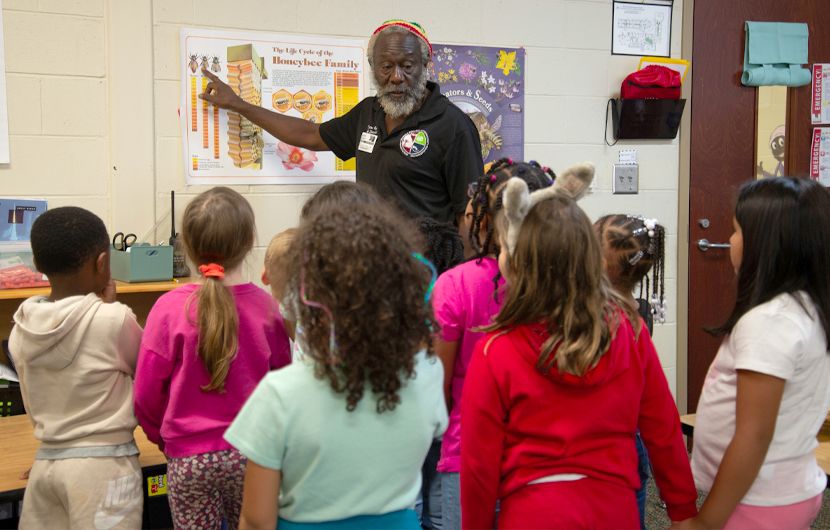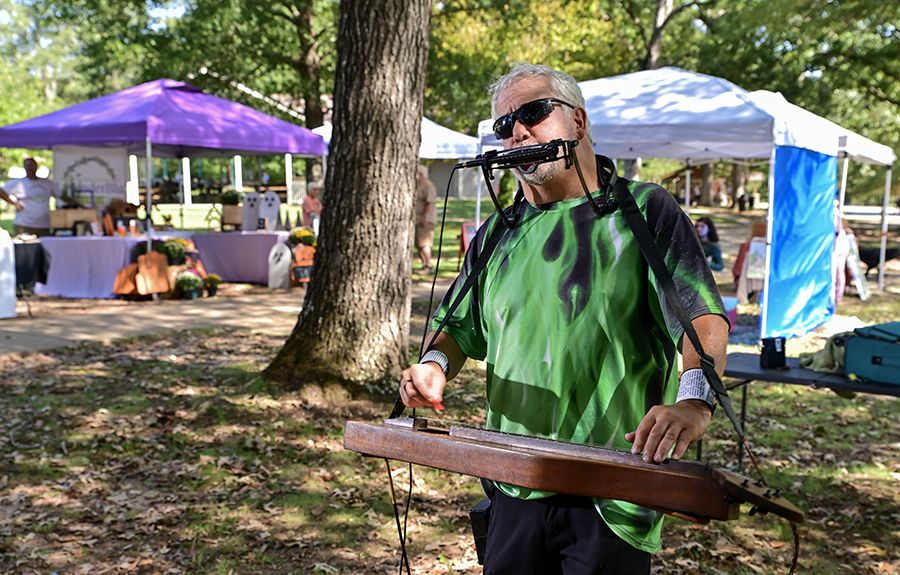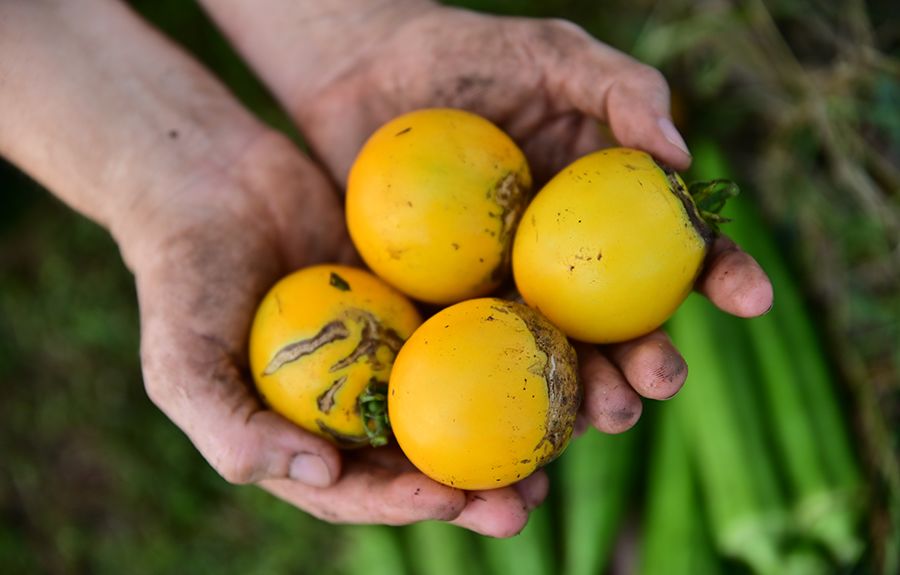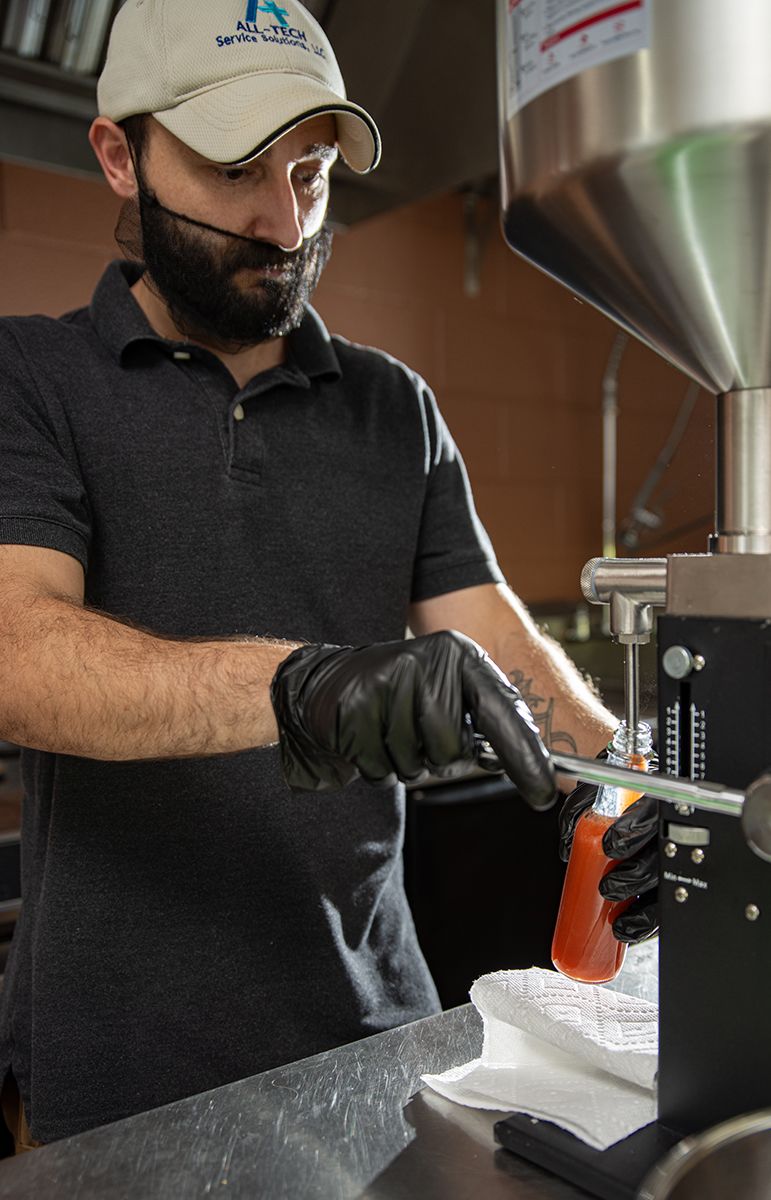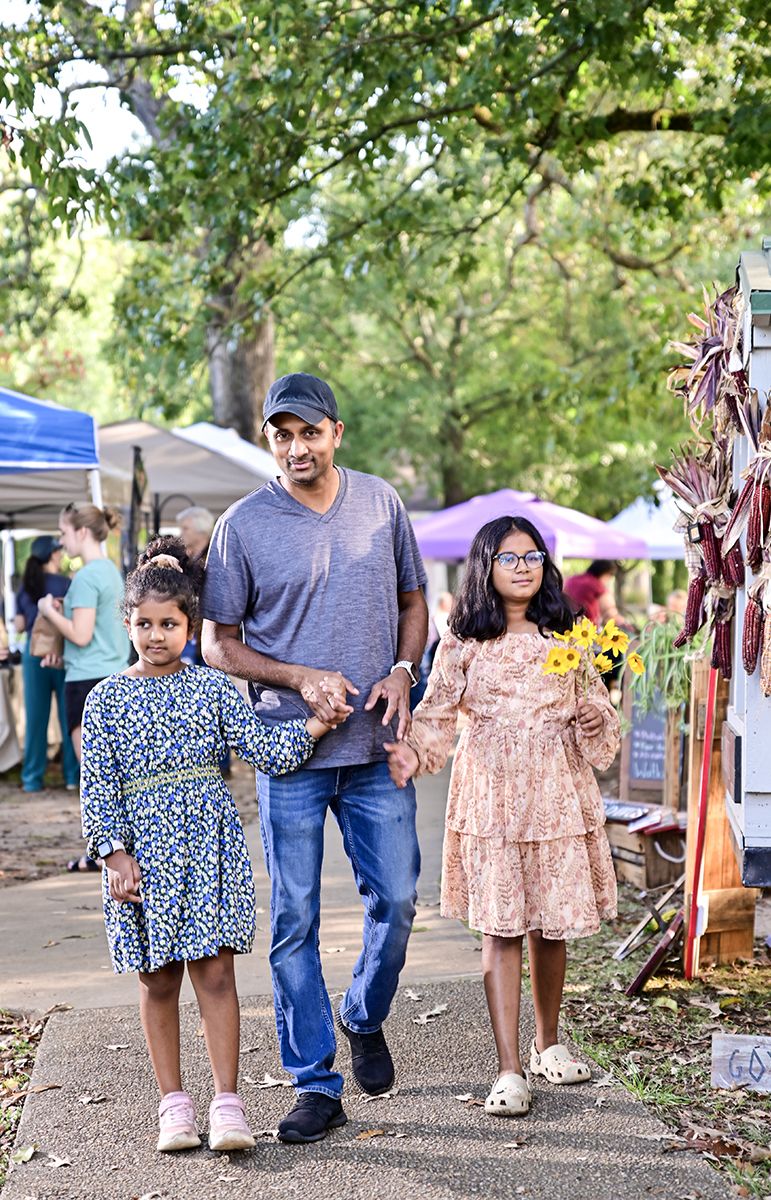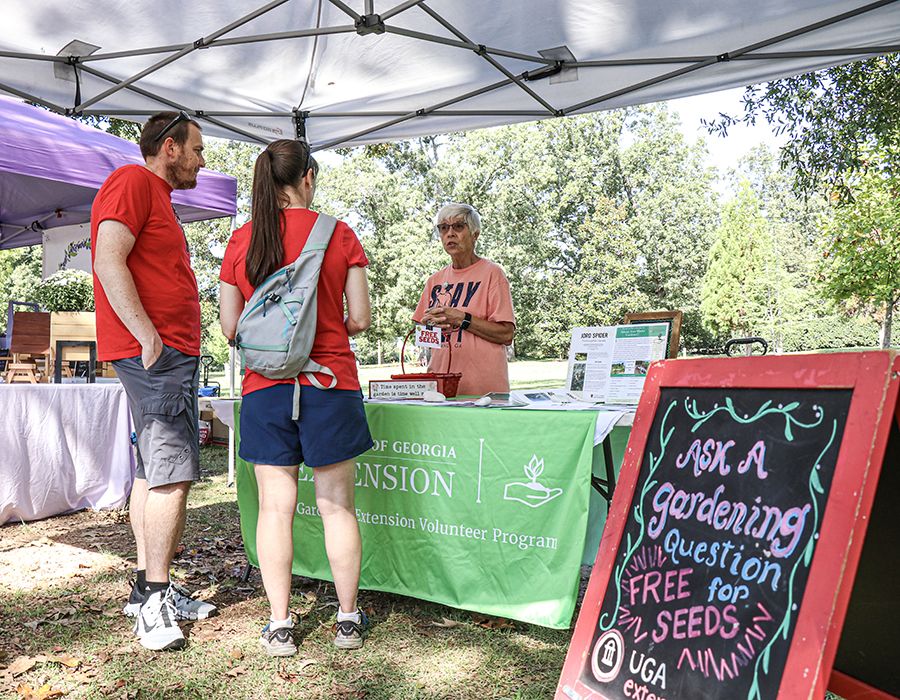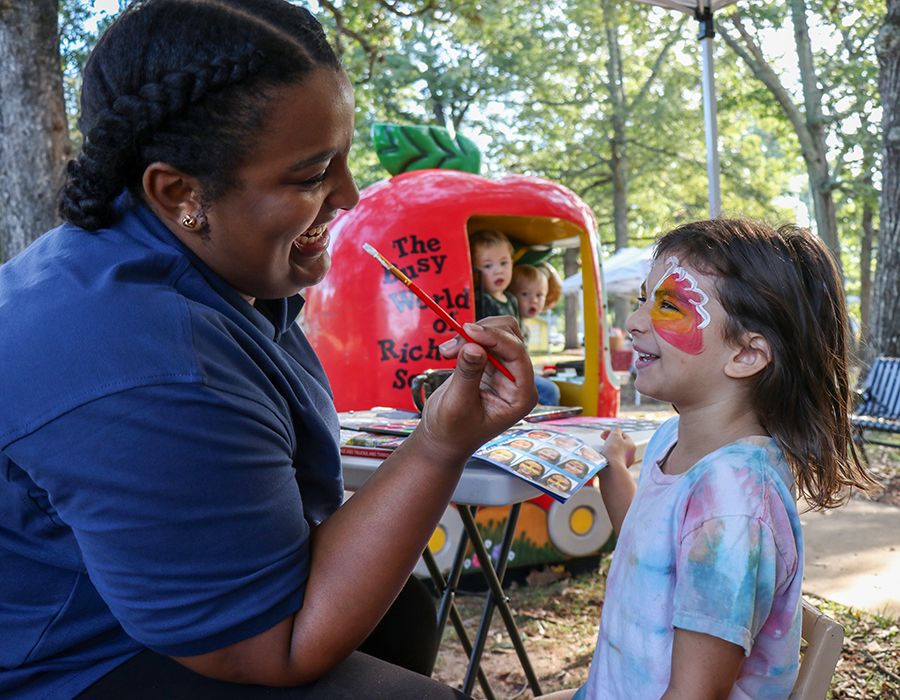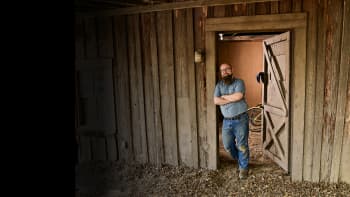Collective Good
How a Georgia farmers market grew into a movement: Inside Winterville’s Marigold Collective
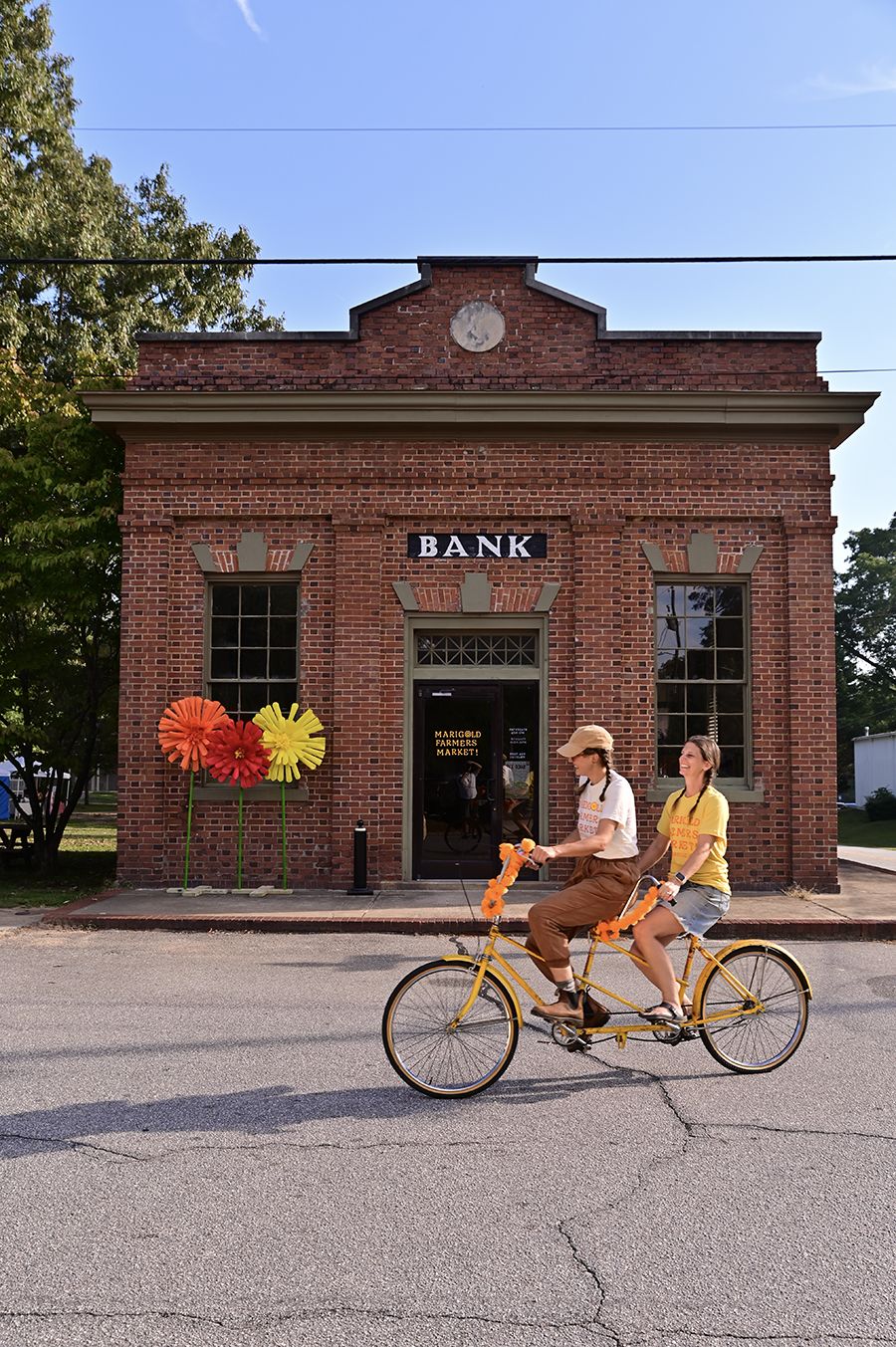
Families play with a parachute at the Marigold Market. (Photo by Katie Walker)
Families play with a parachute at the Marigold Market. (Photo by Katie Walker)
In Winterville, Georgia, a small market grew into a movement. Meet the people behind the Marigold Collective, where farmers, volunteers and neighbors band together to transform fresh food into shared growth.
Founded in the 1840s as a train depot, Winterville is a modest city with deep agricultural roots. Known as the City of Marigolds — a tribute to the resilient flower that symbolizes friendship — this close-knit community is home to farmers, artisans, musicians, nonprofits and small businesses, all connected by a spirit of collaboration.
Produce for sale at the Marigold Collective booth. (Photo by Katie Walker)
Produce for sale at the Marigold Collective booth. (Photo by Katie Walker)
Twice weekly, community members gather at the Marigold Farmers Market in Winterville’s historic town square and connect over fresh produce, homemade goods and a shared commitment to local food.
The market is just one element of the Marigold Collective, a grassroots movement working to make fresh, local food more accessible while creating economic opportunities for small farmers and food entrepreneurs and strengthening the foundation of the community itself.
During the week, Seyoung Holte is Northeast Georgia RESA curriculum director of K-8 mathematics but is also an avid gardener and Pollinator Society member. On weekends, her booth at the Marigold Market buzzes with botanicals. (Photo by Dennis McDaniel)
During the week, Seyoung Holte is Northeast Georgia RESA curriculum director of K-8 mathematics but is also an avid gardener and Pollinator Society member. On weekends, her booth at the Marigold Market buzzes with botanicals. (Photo by Dennis McDaniel)
The sense of connection is tangible here. Farmers share space and resources, and a traveling musician provides a cheerful soundtrack while an entrepreneur perfects a new recipe in the market’s shared community kitchen. Every element, distinct on its own, blooms into a greater whole.
The collective supports more than 20 small family farms across eight Georgia counties.
In Winterville, Georgia, a small market grew into a movement. Meet the people behind the Marigold Collective, where farmers, volunteers and neighbors band together to transform fresh food into shared growth.
Founded in the 1840s as a train depot, Winterville is a modest city with deep agricultural roots. Known as the City of Marigolds — a tribute to the resilient flower that symbolizes friendship — this close-knit community is home to farmers, artisans, musicians, nonprofits and small businesses, all connected by a spirit of collaboration.
Produce for sale at the Marigold Collective booth. (Photo by Katie Walker)
Produce for sale at the Marigold Collective booth. (Photo by Katie Walker)
Twice weekly, community members gather at the Marigold Farmers Market in Winterville’s historic town square and connect over fresh produce, homemade goods and a shared commitment to local food.
The market is just one element of the Marigold Collective, a grassroots movement working to make fresh, local food more accessible while creating economic opportunities for small farmers and food entrepreneurs and strengthening the foundation of the community itself.
During the week, Seyoung Holte is the Northeast Georgia RESA curriculum director of K-8 mathematics, but is also an avid gardener and Pollinator Society member. On weekends, her booth at the Marigold Market buzzes with botanicals. (Photo by Dennis McDaniel)
During the week, Seyoung Holte is the Northeast Georgia RESA curriculum director of K-8 mathematics, but is also an avid gardener and Pollinator Society member. On weekends, her booth at the Marigold Market buzzes with botanicals. (Photo by Dennis McDaniel)
The sense of connection is tangible here. Farmers share space and resources, and a traveling musician provides a cheerful soundtrack while an entrepreneur perfects a new recipe in the market’s shared community kitchen. Every element, distinct on its own, blooms into a greater whole.
The collective supports more than 20 small, family farms across eight Georgia counties, providing a year-round selection of fresh produce both for the market and shared — free of charge — with neighbors in need through partnerships with local schools and community health care organizations.
Laura Ney and Dodd Ferrelle, the mayor of Winterville. (Photo by Katrina Ohstrom)
Laura Ney and Dodd Ferrelle, the mayor of Winterville. (Photo by Katrina Ohstrom)
Ferrelle and his son, Lucas, ride a tandem bike. (Photo by Katrina Ohstrom)
Ferrelle and his son, Lucas, ride a tandem bike. (Photo by Katrina Ohstrom)
Hovater prunes a tomato plant in the Winterville community garden. (Photo by Dennis McDaniel)
Hovater prunes a tomato plant in the Winterville community garden. (Photo by Dennis McDaniel)
Laura Ney
UGA Extension agent
Behind every aspect of the Marigold Collective, you’ll find Laura Ney — and her unwavering support for her community. As the Agriculture and Natural Resources agent for University of Georgia Cooperative Extension in Athens-Clarke County and chair of the collective, Ney’s expertise and vision quietly shape and guide the collective’s work, ever-present and essential to its mission.
Ney was the one Winterville Mayor Dodd Ferrelle and other city leaders approached with their vision, and she immediately got to work coordinating with local entities and seeking grant funding to turn the dream into reality.
As the group prepared to launch its first farmers market, the onset of the COVID-19 pandemic brought everything to a halt. Rather than letting momentum fade, Ney and the market manager shifted the market to a drive-through format to connect vendors and customers.
As restrictions eased and safety measures improved, the market transitioned to an in-person experience and has grown steadily ever since.
“It’s not just about providing a selling space for our growers and small businesses,” she said. “It’s about getting into the community, into the schools — teaching kids about farming, supporting local entrepreneurs, and ensuring people have access to fresh, nutritious food. It’s about identifying needs and finding ways to meet them.”
A soil scientist by training, Ney understands that strong foundations are essential for both healthy plants and thriving communities. She helps secure funding for farmers in the collective to attend field days and grower conferences, giving them opportunities to expand their knowledge and improve their operations.
Whether writing grant proposals or troubleshooting irrigation issues in a farmer’s field, Ney’s tireless efforts have transformed ideas into tangible benefits, making the Marigold Collective a model for addressing food insecurity and strengthening the local food system.
Dodd Ferrelle
Winterville's mayor
Dodd Ferrelle cares deeply about the well-being of all residents of the City of Marigolds. Elected in 2016, Mayor Dodd — as he’s affectionately known to residents — and the Winterville City Council dedicated funds from the American Rescue Plan Act of 2021 to create immediate and transformative change in the community.
Designed to help communities recover from the economic effects of the ongoing COVID-19 pandemic, city leaders directed funding from the act toward two key efforts: tackling food insecurity and repurposing a public facility to serve the community.
Ferrelle contacted Athens-Clarke County Extension with a request for help developing an innovative food hub that would intertwine a farmers market and a shared community kitchen in a community-driven approach to food security.
Thus began the Marigold Collective.
Sarah Hovater,
Director of the Marigold Market
At the proverbial heart of the Marigold Collective is Executive Director Sarah Hovater. A true shepherdess at heart, Hovater balances the rhythms of farm life with the needs of her growing community. She operates a working farm that raises sheep, goats, chickens and rabbits, producing fiber, milk, meat, cheese and soap, which she sells at the collective’s cooperative booth. Her compassion and leadership ensure that every detail, from farm to market, is thoughtfully tended.
But Hovater’s role extends beyond her own farm. She wears many hats, collaborating with Ney and Ferrelle to secure grants, support farmers and small-business owners, and turn ideas into actionable plans. Her careful coordination with growers on crop planning — using historical sales data to ensure both variety and abundance while minimizing overlap — has been key in reducing food waste, optimizing yields and fostering growth within the collective.
Hovater has actively sought partnerships with neighboring farmers markets to strengthen communitywide food access. To foster county connections, she recently established collaboration with Athens Land Trust (ALT), a nonprofit dedicated to creating lasting community assets through affordable housing, local agriculture and land conservation.
A key component of ALT’s mission is the Young Urban Farmers program, which provides high school students with hands-on experience in gardening, farming, culinary arts and entrepreneurship.
These partnerships strengthen the impact of the Marigold Collective and extend its reach into neighboring Athens.
Passport for Produce farm-to-school initiative brings the farmers market to first graders
In 2024, Hovater received a $2,500 Innovation Grant from Wholesome Wave Georgia to launch Passport for Produce, an interactive program connecting Winterville Elementary first graders with local farmers and fresh, seasonal food. Students learn about nutrition, agriculture and budgeting through classroom visits and hands-on activities, including using grant-funded tokens to shop for fresh fruits and vegetables at a Mini Mobile Marigold Market. Families also receive tokens to use at the farmers market, reinforcing the connection between local food and community.
Farmers who are part of the Marigold Collective visit the students to talk about native fruits, vegetable production, and even beekeeping and honey extraction.
“The Marigold Farmers Market is a cornerstone of our town, and this is a wonderful way for students to see firsthand where their food comes from,” said Rosanne Mann, a first-grade teacher at Winterville Elementary.
David Court
Free Range Musician
David Court is Winterville’s very own troubadour — a one-man band who brings classic rock, movie themes and requests to life with his harmonica and mountain dulcimer. You’ll often find him wandering the market, playing everything from the iconic Star Wars and Jurassic Park themes to classic hits that get toes tapping and heads bobbing.
Court, who’s a familiar face at Renaissance fairs, is as much a part of the market’s charm as the produce itself. With rings on his fingers, bells on his shoes and a laminated list of songs on his wrist, he’s ready to fill the air with music — and he’s always up for a request.
He shows up around 10:30 a.m. on Saturdays, a time collective members affectionately call "the wreck of the Edmund Fitzgerald o'clock." So, if you're lucky enough to be at the market when the music starts, you’ll know it’s time to sit back, relax and enjoy the sounds of Winterville’s own wandering musician.
Community seed bank cultivates sustainability
In 2024, Marigold Collective Communications Director Katrina Ohstrom coordinated a new partnership with the Cooperative Gardens Commission to serve as a seed hub for distributing donated food seeds. Community members also contribute heirloom varieties to the community seed exchange, sharing crops like super-hot peppers, peas and Choctaw sweet potato squash.
Hovater grows the squash seeds as a tribute to her roots as a tribal member of the Choctaw Nation of Oklahoma. She has shared these heritage seeds with farmers in the collective, helping to continue the cultivation of these meaningful varieties.
The hope is that the seed hub will inspire residents to start their own gardens and contribute to the seed bank with saved seeds at the end of the season, fostering a collaborative and sustainable effort.
This year, the remaining funding that helped kick-start the market will be used to pay farmers to grow selected, nutrient-dense crops that are culturally significant and well-suited to the local climate. The goal is both to provide seeds and to encourage farmers to grow, save and share seeds from their best plants for future use, reinforcing the idea of a continuous cycle of growth and long-term sustainability.
Decton Hylton of the Equity in Conservation Outreach-Next Generation Farmer Leadership program speaks to students about pollinators. The initiative, supported by the Regenerative Institute of Community Education, is part of the Passport to Produce program, which teaches children about locally grown foods and budgeting through funding from Wholesome Wave Georgia. (Photo by Sarah Hovater)
Decton Hylton of the Equity in Conservation Outreach-Next Generation Farmer Leadership program speaks to students about pollinators. The initiative, supported by the Regenerative Institute of Community Education, is part of the Passport to Produce program, which teaches children about locally grown foods and budgeting through funding from Wholesome Wave Georgia. (Photo by Sarah Hovater)
Wandering musician David Court serenades market-goers with classic rock and pop cultural music touchstones on his dulcimer. (Photo by Dennis McDaniel)
Wandering musician David Court serenades market-goers with classic rock and pop cultural music touchstones on his dulcimer. (Photo by Dennis McDaniel)
The seed hub helps community members plant their own harvest. (Photo by Dennis McDaniel)
The seed hub helps community members plant their own harvest. (Photo by Dennis McDaniel)
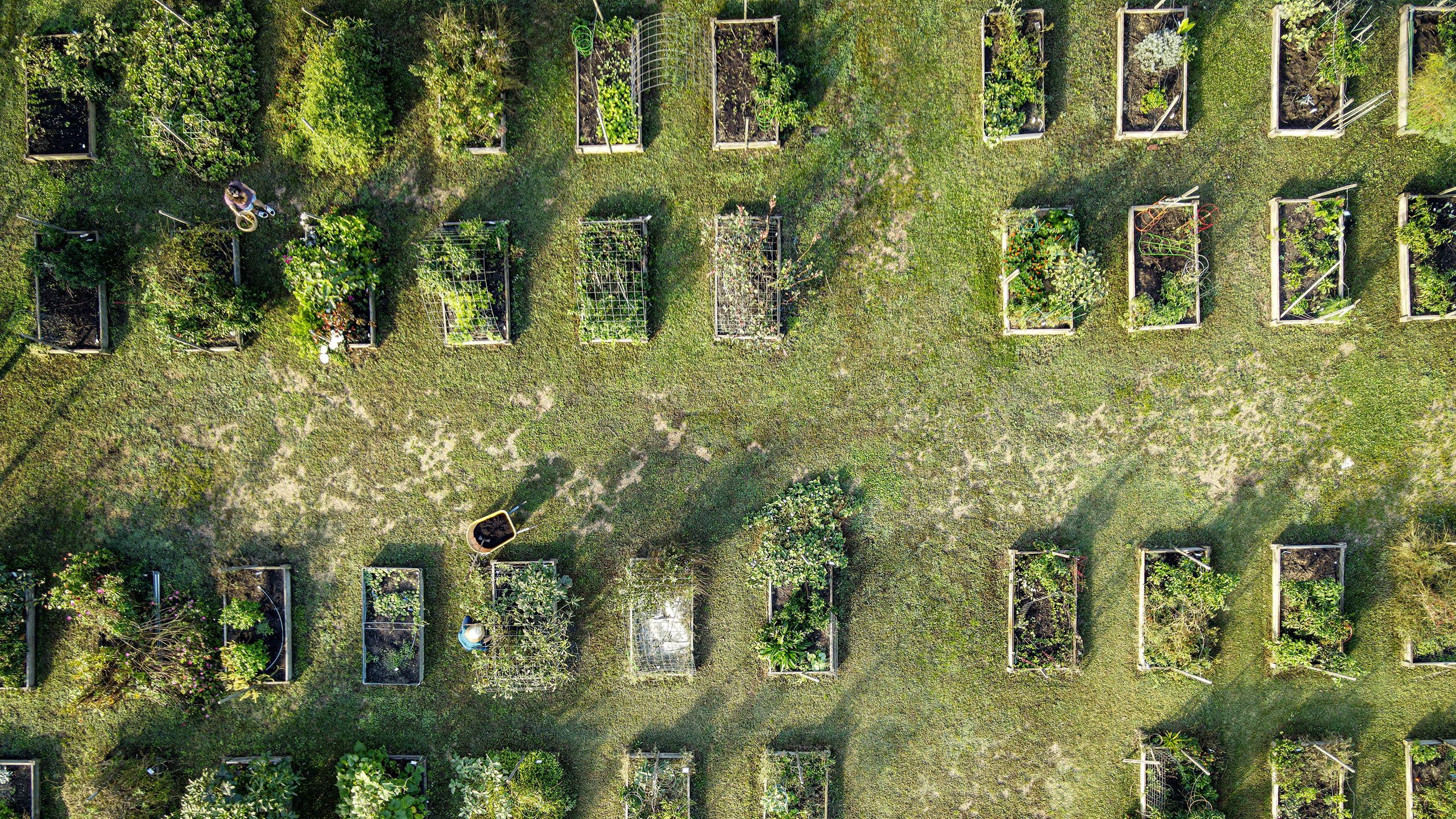


(Photo by Dennis McDaniel)
(Photo by Dennis McDaniel)
Community garden and compost facility
Long before the Marigold Collective took shape, community members transformed an abandoned parking lot in the town square into a flourishing community garden.
Through educational talks and consulting, Ney helps to ensure the success of the Winterville Community Garden, securing a Zero Waste Grant to establish a compost facility at the garden where community members can drop off compost materials. The materials are processed through a disposal system that quickly breaks down waste and feeds into a vermicompost bin. The worms, also grant-funded, are part of a closed-loop system: leftover market funds purchase excess food from farmers, VISTA volunteers turn the food into meals for community members, meal scraps feed the worms, and the resulting compost nourishes the garden — bringing the cycle full circle.
From community kitchen to market
Supporting local food producers is central to the Marigold Collective’s mission, and its shared community kitchen helps turn ideas into viable businesses. The kitchen provides small food businesses with a certified space to safely prepare products for sale, making it easier for aspiring entrepreneurs to get started.
For food entrepreneurs like Wayne Campbell, who makes hot sauce, access to a licensed kitchen isn’t just a convenience — it’s a necessity. Health regulations require that any food sold to the public be prepared in a licensed facility, ensuring compliance with state and federal safety guidelines. For small-batch producers who can’t afford their own commercial setup, shared kitchens eliminate a major barrier to entry, allowing them to scale their businesses legally and sustainably.
On market mornings, the kitchen is buzzing with activity. Campbell, a veteran with a passion for plant breeding and regenerative agriculture, is busy bottling his latest batch of hot sauce. His ties to Winterville run deep — his children attend Winterville Elementary, and his wife, Molly, a doctoral candidate at UGA, is assisting Jonathan Scott with the archaeological dig at the historic blacksmith’s shop just steps from the market.
Points of connection
The kitchen also serves as a hub for other small food businesses, including Ceylon Snack Hut, owned by TC Jayalath. He and his wife founded their cottage food business specializing in Sri Lankan sandwiches and beverages to bring a taste of their home to Georgia. Each week, they sell their creations at the Marigold and Athens farmers markets with help from their two daughters.
Jayalath moved to the U.S. in 2010 to pursue a master’s degree in organic farming at CAES. Taking a course with the late Marc van Iersel, a renowned innovator in sustainable agriculture, deepened his interest in controlled environment agriculture. He earned a master’s degree in 2016 and a doctorate in 2023, both in horticulture. Today, he manages 52 greenhouse compartments and 32 growth chambers, overseeing a team of six greenhouse managers and 10 student workers.
As a Marigold Collective board member, Jayalath plays a key role in shaping the organization’s vision, supporting both growers and market vendors. His expertise in greenhouse production and knowledge of the cottage food industry provides invaluable guidance to the collective, helping to strengthen the local food system.
Wayne Campbell bottles up strawberry pepper hot sauce in the community kitchen. (Photo by Dennis McDaniel)
Wayne Campbell bottles up strawberry pepper hot sauce in the community kitchen. (Photo by Dennis McDaniel)
TC Jayalath and his daughters walk through the market. (Photo by Dennis McDaniel)
TC Jayalath and his daughters walk through the market. (Photo by Dennis McDaniel)
Market-goers stopped at the UGA Extension booth to ask Master Gardener Extension Volunteer Debbie Dyer, of Winterville, why their 4-year-old swamp milkweed isn't flowering. Dyer advised the pair to test their soil and provided additional guidance. (Photo by Katie Walker)
Market-goers stopped at the UGA Extension booth to ask Master Gardener Extension Volunteer Debbie Dyer, of Winterville, why their 4-year-old swamp milkweed isn't flowering. Dyer advised the pair to test their soil and provided additional guidance. (Photo by Katie Walker)
AmeriCorps VISTA volunteer Helen Belete paints Johanna Cabrera's face at the Marigold Market. (Photo by Katie Walker)
AmeriCorps VISTA volunteer Helen Belete paints Johanna Cabrera's face at the Marigold Market. (Photo by Katie Walker)
UGA Extension supports local agriculture and community
In every Georgia county, UGA Extension is a part of the local community — meeting people where they live and connecting them to the knowledge and resources they need to grow and thrive in every stage of life, from youth development through 4-H to family and consumer sciences to agriculture and natural resources.
An Extension agent isn’t just part of the community; they help the community define what it wants to be. And Extension isn’t just for farmers. All are welcome, and there’s something for everyone at your local Extension office. All you need to do is ask.
Helen Belete,
AmeriCorps volunteer
Through a partnership between the University of Georgia’s Office of Service-Learning and the AmeriCorps VISTA and AmeriCorps Community Food Fellows programs, two volunteers are in place at the Marigold Collective to support efforts to combat food insecurity and reduce food waste.
During the farmers market, AmeriCorps volunteers lead educational activities for children and families, host workshops, and manage a community garden plot.
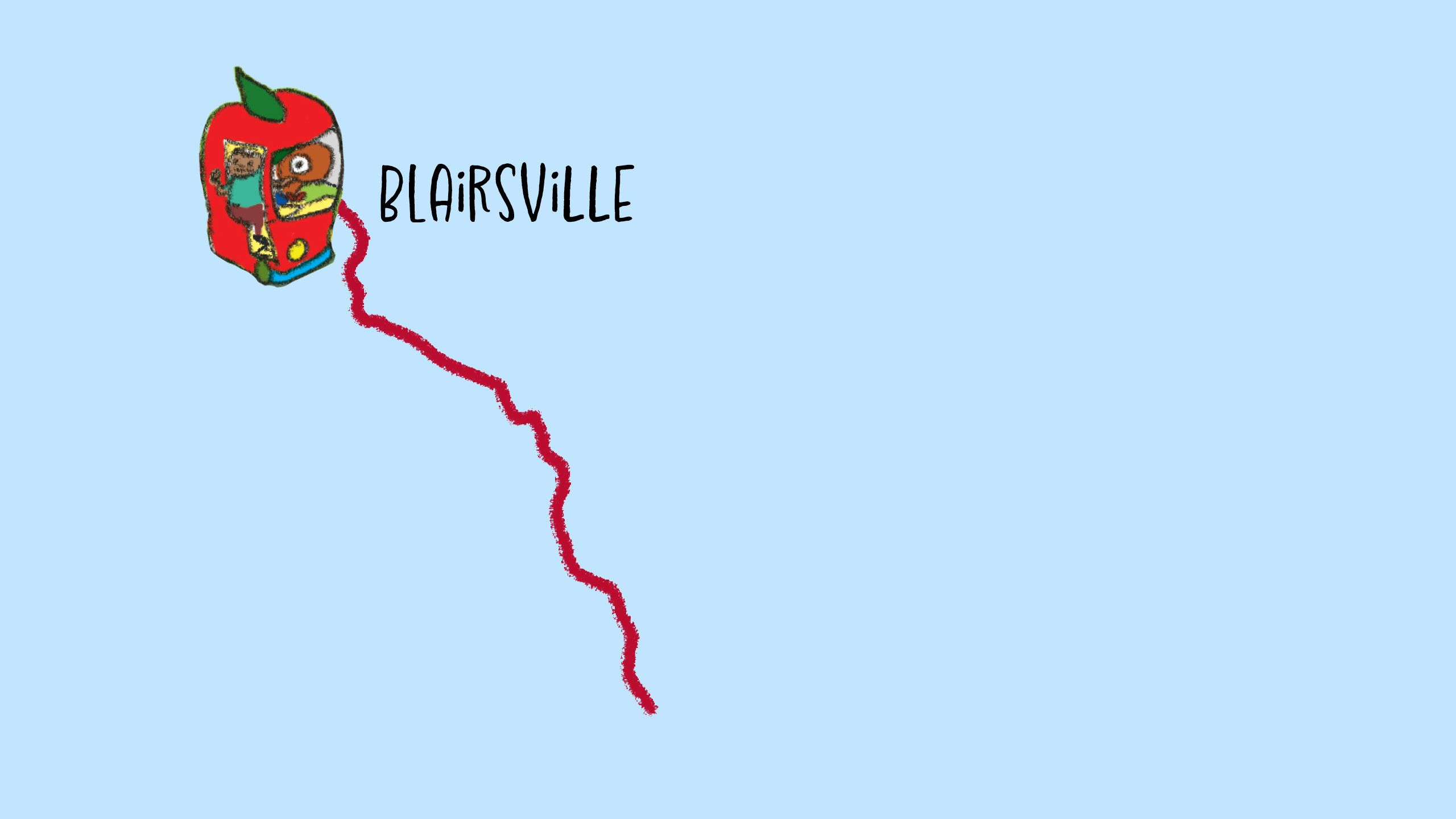


Apple (car) picking
When Ney stumbled upon a Richard Scarry apple car for sale, she knew it belonged at the market. She reached out to farmer and Marigold Collective board member Lydia Engelsen of Sungate Farm, who was immediately in for an adventure. Engelsen made the trek to Blairsville, Georgia, to pick up the whimsical ride — making sure to grab a bag of apples while she was there — bringing it home to the market.
Now, the apple car is a beloved fixture, delighting kids (and plenty of adults) each week. It sits near the children’s booth, where AmeriCorps volunteers offer face painting, lawn games and the occasional giant, rainbow parachute tarp. Just another Saturday at the market, where community and a touch of childhood magic go hand in hand.
Ferrelle, Lucas and Ney watch Ney's son take Lowly Worm's Apple Car for a joy ride. (Photo by Katrina Ohstrom)
Ferrelle, Lucas and Ney watch Ney's son take Lowly Worm's Apple Car for a joy ride. (Photo by Katrina Ohstrom)
From rails to trails: Winterville's history as a transportation hub
Winterville, originally known as Six-Mile Station, was established in the 1840s as a Georgia Railroad depot east of Athens. In the 1850s, the Winter family, German immigrants, settled in the area and became integral to the growing community. The depot was renamed Winter’s Station after Heinrich Winter, the first section foreman. In 1866, when his cousin, John Winter, became postmaster, the village officially became Winterville. With the railroad’s influence, Winterville thrived well into the 20th century.
Winterville's historic blacksmith shop, believed to be constructed around 1890, is now home to an archaelogical dig. Conner Short and Molly Campbell (center), archaeologists volunteering at the excavation, help children Amelia Steinmetz (left) and Marlo Mortensen (right) sift through dirt for artifacts. Campbell's farm, Mollypop Farms, is part of the Marigold Collective and her husband, Wayne Campbell, was making hot sauce in the nearby community kitchen while Molly worked at the site. (Photo by Katie Walker)
Winterville's historic blacksmith shop, believed to be constructed around 1890, is now home to an archaelogical dig. Conner Short and Molly Campbell (center), archaeologists volunteering at the excavation, help children Amelia Steinmetz (left) and Marlo Mortensen (right) sift through dirt for artifacts. Campbell's farm, Mollypop Farms, is part of the Marigold Collective and her husband, Wayne Campbell, was making hot sauce in the nearby community kitchen while Molly worked at the site. (Photo by Katie Walker)
Digging history at the smithy
Sharing space on the town square, the historic blacksmith shop is set to become the future home of the Marigold Collective grocery store — preserving history while serving the community in a new and meaningful way.
Currently, Jonathan Scott, chair of the Winterville Historic Preservation Commission, is leading an archaeological excavation at the 1850s-era blacksmith shop. As restoration and rehabilitation efforts move forward, the dig provides valuable insight into the site’s past, uncovering artifacts that help piece together the blacksmith shop’s role in Winterville’s early development.
Mortenson holds an artifact she found while sifting at the archaeological site. (Photo by Katie Walker)
Mortenson holds an artifact she found while sifting at the archaeological site. (Photo by Katie Walker)
How bicycles connect paths to produce
Winterville, which was incorporated in 1904, is situated along a section of the abandoned Athens-to-Savannah railroad spur. Now, Athens-Clarke County is developing the old rail route into a paved walking trail called the Firefly Trail, which will eventually connect to the Georgia Hi-Lo Trail, creating the longest paved trail and longest arboretum in the United States.
BikeAthens is a nonprofit organization that works to build equity in transportation, advocates for safe and connected cities, repairs bikes for people who need them, and teaches safe cycling to people of all ages. The organization can be found at the Marigold Market from time to time, offering free bicycle inspections and tune-ups.
Michael Goltzer, a cyclist and BikeAthens board member and volunteer, works on a bike during a free repair clinic held at the Marigold Market. (Photo by Dennis McDaniel)
Michael Goltzer, a cyclist and BikeAthens board member and volunteer, works on a bike during a free repair clinic held at the Marigold Market. (Photo by Dennis McDaniel)

